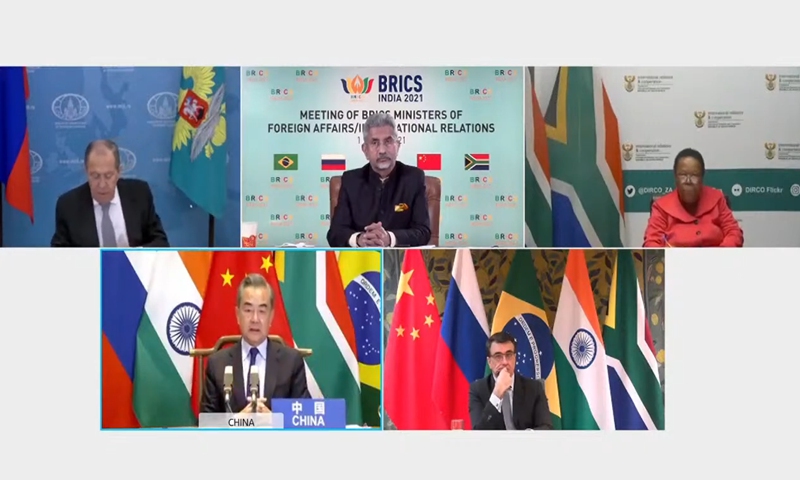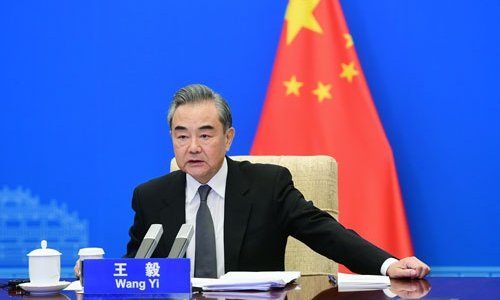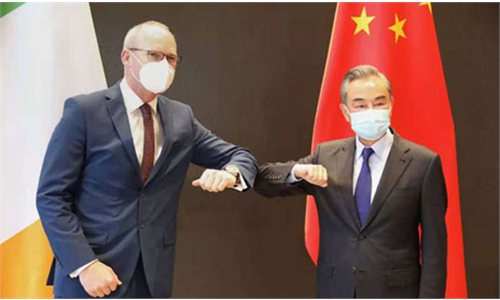China renews anti-pandemic support for India via BRICS
Conference sends unity signal, plans joint efforts

Photo: screenshot of BRICS Foreign Ministers virtual meeting on Tuesday
By emphasizing unity of jointly weathering COVID-19 pandemic, and boosting economic recovery and cooperation on international and regional issues, the BRICS Foreign Ministers virtual meeting on Tuesday was seen by observers as sending a strong signal of bloc members' desire to uphold multilateralism, and deterrence to countries like the US that tried to fragment the organization and sow discord among the BRICS members.At the invitation of Indian External Affairs Minister S. Jaishankar, Chinese State Councilor and Foreign Minister Wang Yi attended the meeting via video link. During the meeting, Wang stressed that Beijing stands with New Delhi amid the COVID-19 crisis, and that all BRICS member countries including China will provide support and assistance to India as it fights against the second wave of the pandemic.
The meeting was also attended by Brazilian Minister of Foreign Affairs Carlos Alberto Franco Franca, Russian Foreign Minister Sergey Lavrov, and South African Foreign Minister Grace Naledi Mandisa Pandor.
The ministers noted at the meeting that the COVID-19 crisis has posed many challenges for economic and financial stability. They emphasized the importance of BRICS in responding to the COVID-19 crisis through policy support and enhancing intra-BRICS and international coordination, according to a statement on Chinese Foreign Ministry's website.
Wang Yiwei, director of the institute of international affairs at Renmin University of China, told the Global Times that the meeting's urgent task is to help its members especially India walk out of the COVID-19 pandemic shadow as soon as possible, and that the members will strengthen vaccine cooperation.
Although such topics were raised during Jaishankar's meeting with his US counterpart Antony Blinken last week, it did not yield any substantial outcome. Observers said the meeting was Jaishankar's attempt of "publicity stunt" to appease public anger over the Indian government's anti-epidemic failures, but the indifferent US just provided yet another "empty check" without taking any helpful moves.
Being worried about harming its independence as a great power, New Delhi has been reluctant to accept aid from any other nation. However, India is more comfortable if such help is from a multilateral mechanism, and that is where BRICS comes in and may play the role, Long Xingchun, a senior research fellow with the Academy of Regional and Global Governance at the Beijing Foreign Studies University and president of the Chengdu Institute of World Affairs, told the Global Times on Tuesday.
Chinese vaccine developer Sinovac is leading the initiative to develop the Chinese branch of the BRICS vaccine research and development center, a joint vaccine cooperation effort by the five BRICS countries.
It will promote joint research, development and clinical trials of vaccines, as well as the construction of factories, production licensing and mutual recognition of standards among the BRICS countries through online and offline approaches.
Wang Wenbin, spokesperson of China's Ministry of Foreign Affairs, said on Tuesday that the conference is of special significance to promote the post COVID-19 pandemic world economic recovery.
"Together we will send out a strong signal that BRICS countries, with solidarity and cooperation, support true multilateralism, promote post epidemic economic recovery and tackle global challenges," he said.
Zhu Tianxiang, director at the Institute of Foreign Relations of the BRICS Research Institute of Sichuan International Studies University also expects the foreign ministers to have buttressed implementation of counter-terrorism, and to reach consensus on regional hot issues, including the Palestine-Israel conflict, urging the parties involved to cease using violence and solve their divergence in political and diplomatic means.
BRICS brings together five of the world's largest developing countries, representing 41 percent of the global population, 24 percent of the global GDP and 16 percent of the global trade.
Yet all five economies have been battered by the COVID-19 pandemic since last year. Official data from India shows that the country's economy contracted 7.3 percent in 2020-21, marking the worst recession the country has experienced in decades.
Zhu also mentioned that the foreign ministers are likely to push forward the implementation of the Strategy for BRICS Economic Partnership 2025, which defines a development path of BRICS and sets the framework for cooperation of its members. He predicted such cooperation will emphasize anti-pandemic related industries to further boost members' economic recovery.
The meeting was held days before a G7 summit, and will balance the world in both politics and global supply chain as it is telling the world that the world order and global supply chain is not dominated by the US and its cliques.
Yet experts warned that the new US tactic of forming cliques to contain other countries, especially China and Russia, puts an obstacle for the bloc members' cooperation and even sows discord among the BRICS members. The BRICS Foreign Ministers' meeting sends a strong signal to countries like the US which tried to fragment the organization by luring its members.
During Jaishankar's visit to the US, he strongly defended "Quad," a coalition forged by India, Australia, Japan and the US to counter China in the Indo-Pacific region.
Moscow over the past few months also repeatedly conveyed to New Delhi its displeasure over the "Quad," with Lavrov in December 2020 calling the four-nation coalition a "divisive" and "exclusivist" tool being used by the US to implement its "devious policy" of engaging New Delhi in games against China as well as to undermine Russia's partnership with India.
Qian Feng, director of the research department at the National Strategy Institute at Tsinghua University, said that although India has been reluctant to turn Quad into an anti-China alliance, its leaning closer to the US will undermine BRICS unity.
Yet after seeing the US turning its back amid the pandemic, India, which sees great potential in cooperating with BRICS members to save itself from a post-pandemic economic swoon, may be very cautious in leaning too close to the US or acting as an instability factor in the BRICS, Qian said.







